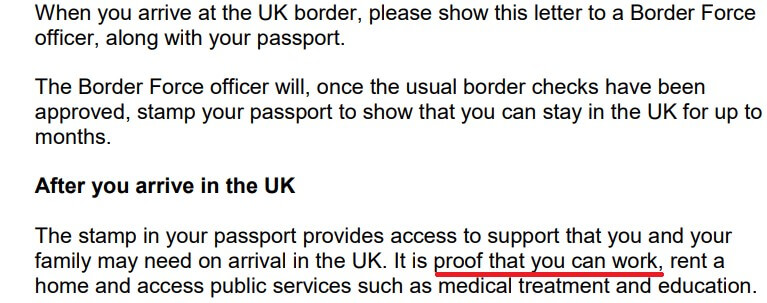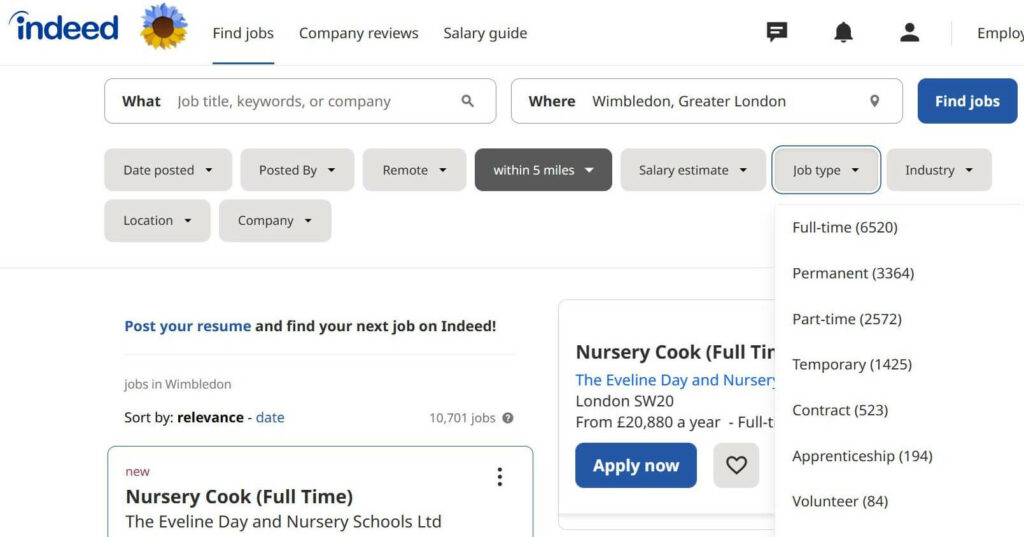Finding Work As a Ukrainian Refugee
As a Ukrainian refugee, it will be a priority to find work in the UK for most people. This brings financial independence and also enables you to be in a better position when it is time to move on from your sponsor and to find rented accommodation. We provide some useful information on this page around work and jobs.
One of the key things you need to demonstrate when it comes to renting is that you can pass the stringent affordability checks required (see Renting Privately). You will need a steady job with good income to be in the best position. Having no job, a part time job only, studying or retraining in a different career can all be barriers to renting; such plans may have to be put on hold. In order to work full-time, it’s essential to plan in advance and arrange childcare if you are a parent.
People looking for work in the UK don’t tend to post on Facebook or other social media channels, asking for a job. They tend to look on ‘job boards’ which are websites that companies use to advertise vacancies. Using job boards puts you in control of your job search. We highly recommend this approach, and provide details of some well-known job boards on this webpage.
Finally, you don’t do need to do this alone; there is support available to you in your job search; we highly recommend working with your local council’s ’employability organisation’ for example.
On this page
- Your right to work as a Ukrainian in the UK
- Wages, taxes, pensions and other deductions
- Understanding your rights and responsibilities at work
- Zero hours contracts
- Preparing to find work
- Organisations that help refugees to find work
- Job fairs
- Job vacancy boards and websites
- Job sectors that are hiring
- Apprenticeships
- Qualified professionals
- Background checks for work (DBS)
- Working for yourself
- Jobs with accommodation
- Job scams and modern slavery

Your right to work as a Ukrainian in the UK
We have seen a few misconceptions and questions arise around this, so we think it is worth stressing that your Homes for Ukraine, Family or Extension visa allows you to work straight away in the UK. You do not need a National Insurance number to legally start work. You do not need an employer to ‘sponsor’ you by getting you a sponsorship visa. You can show an employer this webpage and the Government Guide if your employer is insisting on a National Insurance number first.
You may want to show employers this section from the Government Welcome Guide – https://www.gov.uk/guidance/get-a-national-insurance-number-homes-for-ukraine: You can look for and start work without a National Insurance number if you can prove you have the right to work in the UK.
You can prove your right to work by generating a share code using your UK Visas and Immigration (UKVI) Account, which you should have set up by now: https://www.gov.uk/prove-right-to-work/get-a-share-code-online. If you don’t have a UKVI account set up yet, you can use the vignette or visa sticker in your passport. See https://www.gov.uk/prove-right-to-work/using-immigration-documents.
Also see this excerpt from a Permission to Travel letter, which also proves you have the right to work from the first day of your arrival in the UK.

Wages, taxes, pensions and other deductions
For information on national minimum wages, income tax rates, national insurance contributions and workplace pensions, see our webpage: Wages, Taxes and Other Deductions.
On this page, you’ll also find details of what to do if you think you’re paying the wrong tax.
Understanding your rights and responsibilities at work
If you are working for an employer, or are planning to employ people yourself, it’s necessary to be aware of your rights and responsibilities. This area is complicated and we are therefore only signposting you to some available help. Seek professional advice as needed.
Acas (the Advice, Conciliation and Arbitration Service) is an independent and reputable organisation that provides guidance on employment for employees, workers and employers, including information on rights and responsibilities for various situations. They have produced some useful guides which may be easier to follow than some of the Government pages.
See https://www.acas.org.uk/employment-contracts for a description of employment contracts for example, and how to determine your employment status and rights such as entitlement to holiday, sick pay and so on. For example, whether you are likely to be classed as an ’employee’ or a ‘worker’ has different implications for you; see https://www.acas.org.uk/checking-your-employment-rights. There is also a description of ‘agency workers’ for example, who are employed via an agency to work for an organisation: https://www.acas.org.uk/agency-workers
You can contact Acas for advice about employment status, employee rights or employer responsibilities, especially if something doesn’t feel right to you, or you’re not sure if it’s allowed. They can also help with any work-related disputes. It should be possible to ask for an interpreter. Their helpline number is: 0300 123 1100.
Note that the equivalent agency in Northern Ireland is the Labour Relations Agency; their website is: https://www.lra.org.uk/ and contact number is 03300 555 300.
Another organisation that can support you with problems at work such as non-payment from the employer of money they owe you, is the Wrok Rights Centre. They hold face to face clinics in London and Manchester. You can contact them here: https://www.workrightscentre.org/get-our-help
Zero hours contracts
It is possible for some jobs to be advertised as ‘zero hours’ contracts. This means that your number of working hours are not fixed; some weeks you may have work and other weeks you may be told there is no work for you.
You still have some rights with this type of contract; Acas covers these at this link: https://www.acas.org.uk/zero-hours-contracts.
If you do need to take such a job to begin with, please be aware that it may be difficult to prove your monthly income later on when you need to rent (see Renting Privately).
Preparing to find work
Create a curriculum vitae (CV) or resume of your experience to date. Your Job Centre work coach can help you draft a CV. Try to emphasise soft skills such as resilience, ability to learn new things quickly, and adaptability if you do not have immediately obvious relevant work experience. Be positive; say for example that your English is ‘improving’, not ‘bad’!
For many business industry careers, such as IT and finance, it’s best to join the professional networking platform LinkedIn, where you can create a profile and set your status to ‘Open to work’ in order for recruiters to find you. You can also start to build up a professional network of connections on this platform.
Note that the UK has an active recruitment consultancy sector, where it’s quite common for a recruiter to be engaged by a company to find them candidates to interview for their vacancies. The recruiter’s role is to find and put forward good quality candidates who are worth interviewing, so they will at times conduct a ‘mini interview’ to make sure they understand your background and suitability for the role. A good recruiter will have developed contacts and networks in their field of specialism and will be interested in building a relationship with good candidates, so that even if one role doesn’t work out, they might find them another. Recruiters typically get paid a percentage of the agreed salary by the company should they go on to employ the candidate they found, so you do not pay them anything.
If you have taken up a job in the meantime that doesn’t require a high level of English, we still think it’s important that you can get to some English classes suitable for the level you are at, as this will improve your job chances in the future and help you settle into the UK better. The best opportunity to learn English is when you first arrive. Learning and practising English while working or volunteering is also valuable; it doesn’t only have to be through classes.
Organisations that help refugees find work
There are a number of organisations that help people to find work, especially if they are refugees or otherwise at a disadvantage. They can help with preparing CVs, and interiew practice, and sometimes, they offer programmes that result in guaranteed interviews with employers. It’s recommended to take advantage of such help. We have given some options here that we are aware of: Organisations That Help Find Work.
Job vacancy boards and websites
Here are some job websites that allow you to enter a postcode and find jobs within a certain number of miles. There are many other such ‘job boards’ out there.
- Job Vacancies | Find a Job – reed.co.uk – this has a good selection of jobs in different industries
- https://uk.indeed.com/jobs – this has a good selection of jobs in different industries, and support for Ukrainians. You can search for ‘Russian speaking’ and ‘Ukrainian speaking’ jobs where you might have an advantage over the general population
- https://uk.jooble.org/ – this job website brings together jobs from multiple other websites and is Ukrainian-based
- https://findajob.dwp.gov.uk/ – managed by the Department of Work and Pensions
- Find an apprenticeship – GOV.UK (www.gov.uk) – to find an apprenticeship
- https://www.caterer.com/ – for jobs in restaurants, hotels etc
- https://jobtoday.com/gb – there is also a JobToday app you can use
- https://www.totaljobs.com/
- https://www.monster.co.uk/ – they also have support for Ukrainian refugees and you can register on their talent pool
- Jobs for Ukrainians | Facebook – this group seems to have genuine opportunities targeting Ukrainians, although in general, be careful of job adverts on social media which tell you nothing about the job and urge you to contact the job poster in private; these are likely to be scams.
LinkedIn, which is a widely used professional networking platform, has a huge selection of jobs and is probably the default location used by companies, organisations and recruiters to advertise jobs in business areas such as IT, marketing, finance, accounting, operations etc. As mentioned above, create a LinkedIn profile and start searching!
See for example how to search within a particular geographical area on Indeed, and the types of jobs (full-time, part-time, apprenticeships etc) that you can filter on.

Almost all job boards will allow you to set up a relevant job search alert whereby new opportunities that match your preferences are emailed to you automatically.
Give yourself time to find a job and remember there are a lot of other applicants looking as well; expect to make many applications in order to get an interview; expect to attend many job interviews before you are offered a job. This is perfectly normal.
Job fairs
Job fairs are events where candidates can register and attend in person to meet a number of different employers in one place. They could be organised by e.g. DWP and you may need a referral from your work coach, or they could be organised privately for a specific sector.
When attending, dress smartly and bring several copies of your CV to hand out. Research the companies attending beforehand so that you know who you might want to talk to, and be prepared to be interviewed on the day itself.
Ask your local Job Centre regularly for details of any job fairs they may know of.
Job sectors that are hiring
We have compiled a selection of industry sectors where jobs may be available. See Job Sectors.
If you are an organisation that is looking to support local Ukrainian refugees with employment opportunities, some useful approaches to consider are:
- Contacting local Job Centres to make them aware of opportunities
- Joining a local Chamber of Commerce to make them aware of opportunities
- Finding out if there are local job fairs that you can exhibit at
- Contacting local council(s) to find out if they partner with any local employability support organisations. The council may also have set up any official Facebook groups for Ukrainians in the community that you can advertise on. There could also be other Facebook groups set up by local community volunteers, or local community meetups
- Getting in touch with organisations that support people in finding work
- Advertising on Facebook groups such as Jobs for Ukrainians | Facebook
Apprenticeships
Apprenticeships are funded programmes to encourage employers to take on people who want to develop a career. The good thing about them is that many don’t require prior qualifications and experience, and you can receive on the job support and training, which could make them ideal for Ukrainian refugees trying to find their feet here.
The Department for Work and Pensions has confirmed the following:
Usually you have to be resident in the UK for 3 years to qualify for Apprenticeship funding but there are some exceptions for individuals with certain type of immigration status, which has been extended to also include:
- Ukraine Family Scheme
- Ukraine Sponsorship Scheme (Homes for Ukraine)
- Ukraine Extension Scheme
Refer to Paragraph P379 on page 141 in the following document: https://assets.publishing.service.gov.uk/government/uploads/system/uploads/attachment_data/file/1148297/2223_Provider_Rules_Version_2_Final_Updated030423.pdf, which confirms this.
Search for an apprenticeship here: Find an apprenticeship – GOV.UK (www.gov.uk)
Qualified professionals
If you are a qualified Ukrainian professional such as a doctor, dentist, lawyer or academic, please see Qualified Professionals for further information on working in your profession in the UK.
Background checks for work (DBS)
Some jobs require an employer to carry out a criminal record check called a DBS (Disclosure and Barring Service) check. The kind of DBS check required depends on the job role. You can only request a ‘basic check’ yourself; an employer or organisation will need to request the other kinds of checks. They will cover the costs for this check.
As you may not have been in this country long enough, your Ukrainian records will also be checked. The Home Office has guidance for employers who want to request overseas criminal records checks, including who can apply, how to apply, and relevant contact details.
Taken from https://www.gov.uk/guidance/find-a-job-homes-for-ukraine: Information on how to obtain criminal record information from Ukraine is available in Ukrainian on the official web-page of the Embassy. This states that Ukrainian citizens can apply for their Ukrainian criminal record in the Ukrainian Consulate in London using the online registration. This procedure usually takes up to one calendar month. In order to speed up the process applicants can obtain the extract from the register online or https://diia.gov.ua/services/dovidka-pro-vidsutnist-sudimosti. In this case the confirmation letter will be issued by the Consulate within 3 working days.
Note that a DBS check is generally required for each new role or employment you have. See https://www.gov.uk/government/collections/dbs-checking-service-guidance–2 for more information, including the different types of DBS check.
Working for yourself
If you are keen to set up your own business in the UK, it might be helpful to talk to organisations that can support and point you in the right direction. We have listed a few here: Organisations That Support Small Businesses.
We have put together some information on how to set yourself to be self-employed, which also covers how to handle your taxes through self-assessment.
Jobs with accommodation
Some jobs are advertised with accommodation (at what should be a discounted rate). For example, if you Google ‘live in hotel jobs’, you may see options on sites such as https://uk.indeed.com/jobs and https://www.caterer.com/.
This might be a good option if you haven’t got suitable accommodation arranged to begin with, but remember that if you need to leave the job, you won’t have anywhere to live any more, so maybe continue to find somewhere of your own to rent after taking the job and related accommodation.
Job scams and modern slavery
You are bound to come across job ads on social media groups and channels which sound too good to be true – offering several hundred pounds a day but not revealing any details publicly about the job or giving a company name or website, you must ‘contact the person in private’.
Be really careful here and don’t give in to temptation. This is a fantastic salary even for someone with many years of professional experience in this country. Have you ever come across any actual reputable company advertising in this way?
You could be asked to take part in a cryptocurrency scam, or you could be in danger of being trafficked and exploited, and you might not realise this until it’s too late.
If you are worried about yourself or anyone being exploited, call the Modern Slavery Helpline on 08000 121 700, in complete confidence. See https://www.unseenuk.org/about-modern-slavery/spot-the-signs/ for signs to look out for.

